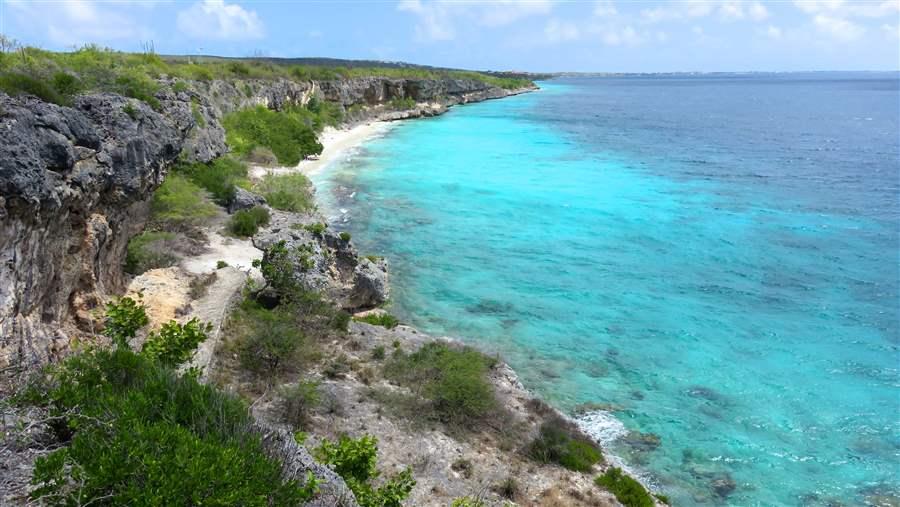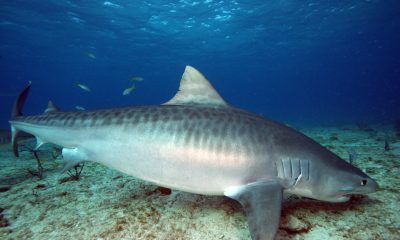Marine Life & Conservation
Shark Sanctuaries Announced Around Dutch Caribbean Islands

On the 2nd September the Dutch government announced that the waters surrounding Bonaire and Saba in the Caribbean Sea will become shark sanctuaries.
Dutch State Secretary for Economic Affairs Sharon Dijksma unveiled the sanctuary plans in Kralendijk, Bonaire’s capital, and in Fort Bay on Saba. The declarations came in response to official letters written in early 2015 by the governors of the two islands in support of shark protections in their waters.
“The reserves will teach us more about the important role sharks play in the marine ecosystem,” Dijksma said. “This knowledge will contribute to the better protection of sharks.”
The sanctuaries will cover the islands’ full exclusive economic zones (EEZs). Once they are implemented, all commercial shark fishing will be prohibited up to 200 nautical miles from each island, a combined total of 22,382 square kilometers (8,816 square miles).
These actions will establish the world’s 11th and 12th shark sanctuaries. Both will also include protections for marine mammals and will be known collectively as Yarari. Regulations will be passed in the coming months to begin implementation of the two shark sanctuaries.
Worldwide, an estimated 100 million sharks are killed each year in commercial fisheries, while nearly 30 percent of all known shark species assessed by scientists are threatened with extinction. This declaration will protect some 27 species of sharks found in the waters of the Dutch Caribbean. Among those threatened and endangered are scalloped hammerhead and Caribbean reef sharks.
“Congratulations to the Dutch government and the island governments of Bonaire and Saba for raising the Caribbean’s high bar for shark protections,” said Luke Warwick, who directs Pew’s global shark conservation project. “Economic studies have demonstrated that sharks are worth far more alive than dead. Guarding sharks around these islands is beneficial, not only for the future of these ecologically important species, but also for protecting the islands’ tourism-based economies.”
The announcement follows “Dutch Shark Week,” a series of outreach and education events that started on the 24th August. Shark Week is part of a larger “Save our Sharks” project, funded by the Dutch Postcode Lottery, the largest charity lottery in the Netherlands, and managed by the Dutch Caribbean Nature Alliance (DCNA).
Nature management organizations on the Dutch Caribbean islands, including Bonaire National Parks Foundation, Saba Conservation Foundation, St. Maarten Nature Foundation, and Arikok National Park Foundation on Aruba, organized shark conservation awareness events during the week. They are working to build awareness and support for shark conservation locally, as parallel efforts organized by the Dutch Elasmobranch Society have been underway in the Netherlands.
“This is a very important step in our shark conservation efforts in the Dutch Caribbean, and we are very grateful to have State Secretary Dijksma make the announcement,” said Tadzio Bervoets, chairman of the Dutch Caribbean Nature Alliance Shark Committee. “The DCNA has launched a three-year shark conservation project to protect these crucially important, yet very misunderstood, creatures in all waters of the Dutch Caribbean. Official protection for Saba and Bonaire is a huge deal for us.”
If the Dutch Caribbean jurisdictions of St. Eustatius, Curacao, Aruba, and St. Maarten follow suit and announce permanent shark protections throughout their waters, the entire Dutch Caribbean would be recognized as a regional shark sanctuary.
Sharks play an important role in maintaining the health of the entire ocean, but they grow and reproduce slowly, which makes them particularly vulnerable to fishing pressure. Protecting all sharks by way of a sanctuary makes clear that these top predators warrant the same status as other vulnerable marine wildlife, such as turtles and whales.
Sharks are among the top species that attract scuba divers, making their presence important to the tourism industry. Safeguarding sharks strengthens the marine ecosystem, including coral reefs and commercial fish stocks. It also helps strengthen industries that depend on a healthy ocean.
Source: www.pewtrusts.org/en
Marine Life & Conservation
Leading UK-based shark conservation charity, the Shark Trust, is delighted to announce tour operator Diverse Travel as a Corporate Patron

 Corporate Patrons provide a valuable boost to the work of The Shark Trust. The Trust team works globally to safeguard the future of sharks, and their close cousins, the skates and rays, engaging with a global network of scientists, policymakers, conservation professionals, businesses and supporters to further shark conservation.
Corporate Patrons provide a valuable boost to the work of The Shark Trust. The Trust team works globally to safeguard the future of sharks, and their close cousins, the skates and rays, engaging with a global network of scientists, policymakers, conservation professionals, businesses and supporters to further shark conservation.
Specialist tour operator Diverse Travel has operated since 2014 and is committed to offering its guests high quality, sustainable scuba diving holidays worldwide. Working together with the Shark Trust will enable both organisations to widen engagement and encourage divers and snorkellers to actively get involved in shark conservation.
“Sharks are truly at the heart of every diver and at Diverse Travel, we absolutely share that passion. There is nothing like seeing a shark in the wild – it’s a moment that stays with you forever!” says Holly Bredin, Sales & Marketing Manager, Diverse Travel.
“We’re delighted to celebrate our 10th year of business by becoming a Corporate Patron of the Shark Trust. This is an exciting partnership for Diverse and our guests. We will be donating on behalf of every person who books a holiday with us to contribute towards their vital shark conservation initiatives around the world. We will also be working together with the Trust to inspire divers, snorkellers and other travellers to take an active role – at home and abroad – in citizen science projects and other activities.”
Paul Cox, CEO of The Shark Trust, said:
“It’s an exciting partnership and we’re thrilled to be working with Diverse Travel to enable more divers and travellers to get involved with sharks and shark conservation. Sharks face considerable conservation challenges but, through collaboration and collective action, we can secure a brighter future for sharks and their ocean home. This new partnership takes us one more valuable step towards that goal.”
For more information about the Shark Trust visit their website here.
For more about Diverse Travel click here.
Marine Life & Conservation
Shark Trust Asks Divers to help with Shark Sightings this Global Citizen Science Month

 Whether you are stuck for ideas of what to do with the kids or are off on the dive trip of your dreams. You can get involved in Citizen Science Month and help the Shark Trust by providing vital data about sharks are rays both close to home and further afield.
Whether you are stuck for ideas of what to do with the kids or are off on the dive trip of your dreams. You can get involved in Citizen Science Month and help the Shark Trust by providing vital data about sharks are rays both close to home and further afield.
In addition to reporting the sharks and rays you see on your dives, the eggcases you find on the beach, the Shark Trust is looking for some specific data from divers who are asked to report any Oceanic Whitetip and Basking Sharks.
Oceanic Whitetip Sharks
The Shark Trust are looking specifically for Oceanic Whitetip Shark sightings over the coming weeks and months. So, if you are diving anywhere in the world, please report your sightings via the website or app.
Website: https://recording.sharktrust.org/
App: Search The Shark Trust in your app store
The Oceanic Whitetip. Known for their incredibly long dorsal and pectoral fins, this species was once the most abundant oceanic-pelagic species of shark on the planet.
Large and stocky, they are grey or brown above, and white below and famous for their huge rounded first dorsal fin and paddle-like pectoral fins. The fins also highly prized within the shark fin trade. Whilst they are mostly solitary, Oceanic Whitetips do occasionally hunt in groups.
An inquisitive species, they were easy prey for fisheries. Combined with their low reproductive rate, they were inevitably at high risk of population depletion. And declines of up to 99% have been reported in certain sea areas. They are listed as Critically Endangered on the IUCN Redlist (2019).
Conservation efforts to discourage further declines include listing on CITES Appendix II and CMS Appendix I. They’re also the only species prohibited from take by all the Tuna RFMOs (Regional Fisheries Management Organisations). However, these measures do not mean that Oceanic Whitetips are not still caught – whether targeted or as bycatch – in some parts of the world. With populations declining at such a high rate, effective implementation of management measures is essential to ensure that the species can recover.
If you are lucky enough to get an image of an Oceanic Whitetip and you record your sighting on the Shark Trust app or website YOU CAN WIN! All images submitted with sightings, that also give consent to use in conservation messaging, will be in with a chance to win an Oceanic Whitetip T-shirt and mug. The competition will run until the end of “Shark Month” in July – so keep those sightings (and images) coming in.
Basking Sharks
Basking Shark (Cetorhinus maximus) season is upon us, and the Shark Trust is asking everyone to keep an eye out for these majestic giants over the summer months. If you see any, you can record your sighting to the Basking Shark Sightings database.
Each year, these mighty fish return to British waters to feed on plankton. You may see one, (or a few if you’re really lucky) from around April-October. They can be seen feeding at the surface of the water, where they look like they’re basking in the sun. Thus, their name!
Sighting hotspots around the British Isles include southwest England, Isle of Man, north coast of Ireland, and western Scotland. The Sea of the Hebrides is the most prolific sightings area in Scotland, but they have been spotted all around the coast and have even ventured into some of the sea lochs. The Shark Trust has received thousands of sightings since the Basking Shark project began, but more data is needed to truly understand what is going on with population numbers and distribution. You can help by recording your sightings this summer.
Great Eggcase Hunt
The Shark Trust has an Easter Egg Hunt with a difference for you to try. Take part in the Great Eggcase Hunt and get involved with a big citizen science project that helps shark, ray and skate conservation. And it’s an enjoyable activity for all the family.
The Shark Trust also want snorkellers and divers to record their underwater eggcase findings. Underwater records help pinpoint exactly where sharks and skates are laying their eggs and can help link to beach records. Learning the depth and substrate that they lay on also helps better understand the species.
Find out more: https://www.sharktrust.org/great-eggcase-hunt
Whether you are diving, snorkelling or exploring on the beach you can take part in Citizen Science Month and get actively involved in shark and ray conservation. Find out more: www.sharktrust.org
-

 News3 months ago
News3 months agoHone your underwater photography skills with Alphamarine Photography at Red Sea Diving Safari in March
-

 News2 months ago
News2 months agoCapturing Critters in Lembeh Underwater Photography Workshop 2024: Event Roundup
-

 Marine Life & Conservation Blogs2 months ago
Marine Life & Conservation Blogs2 months agoCreature Feature: Swell Sharks
-

 Blogs1 month ago
Blogs1 month agoMurex Resorts: Passport to Paradise!
-

 Gear News3 months ago
Gear News3 months agoBare X-Mission Drysuit: Ideal for Both Technical and Recreational Divers
-

 Blogs2 months ago
Blogs2 months agoDiver Discovering Whale Skeletons Beneath Ice Judged World’s Best Underwater Photograph
-

 Gear Reviews2 months ago
Gear Reviews2 months agoGear Review: Oceanic+ Dive Housing for iPhone
-

 Blogs3 months ago
Blogs3 months agoThe Thrilling Encounter with Tiger Sharks at Beqa Lagoon’s ‘The Colosseum’ with Coral Coast Divers









